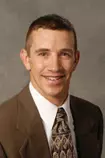
Getting To Know Michigan State Rowing Head Coach Matt Weise
8/30/2004 12:00:00 AM | Women's Rowing
Aug. 30, 2004
EAST LANSING, Mich. -
For the past seven seasons, Matt Weise has contributed to the unparalleled success of Michigan State rowing as assistant coach to the varsity program. Before that, he served as the head coach of MSU's club team as it awaited NCAA sponsorship at a varsity level. Now, Weise steps into a new role as head coach and MSU crew enters a new era of rowing excellence. Read what he has to say, in his own words.
What makes Michigan State a unique place to be a student athlete?
"Michigan State has a great combination of everything. It's a big place, but it doesn't feel like a big place. There is an attitude here that our athletic programs are going to be very successful without being snobby. It's an attitude that embraces the `let's all do it, let's all raise the bar together and get it done,' mentality, rather than those who think, `this is just going to be for me.' MSU athletes tend to have very unselfish attitudes and I think that the crew team really keys into that. They are very good at being a team's team. They want that Michigan State attitude to be a part of their program, as do I."
What would you say to someone with no previous rowing experience who might be interested in walking onto the team? "Come out and try it! Take the risk. You don't know if you are going to be good at rowing or not, but we do, so come out and let us decide for you. What sometimes happens is that people come and try out for a day and they think that they aren't any good, whereas they might be. They might have the potential to accomplish incredible things, but it takes time to learn. We know what we are looking for and people who have no rowing background don't know. If it intrigues you at all, come out for tryouts and let us make the decision. Give it a try!"
What characteristics contribute to the potential for a successful rower?
"You have to be tough. People who are trying out, they don't necessarily have to be fit yet, but there has to be a need to be fit. There has to be the need to push oneself and there is also the competitive aspect. There has to be the need for them to really want to race."
Talk about the changes that this program has gone through since you have been involved: "Obviously, there was a big change from club to varsity and I think that is what we are actually trying to get back to. My first year here, there was a good transition from club to varsity, in that the athletes came in, not knowing anything. They had no idea what to expect, so anything that you told them to do, they just did. They worked really hard and got it done. We progressed in that the athletes have become increasingly talented, but our results really haven't gone with that talent. What I think has happened, is that they have kind of built walls for themselves. Rather than coming into practice and saying, `tell me what to do and I'll get it done,' There is a little bit of a barrier there. So, what I am going to challenge them to do is to be more like when club went to varsity."
 Matt Weise served as assistant coach to the varsity squad for seven seasons. |
|
Specifically, how are you going to make race performances more consistent with the athletes' capabilities?
"We need to be more efficient with out time, on the water, particularly. We can probably get ourselves to row 20 more miles per week, just by being more efficient with our time when we are at the boathouse. The other thing that I want to work on is just really challenging them to race every day. What happened a lot this past spring, was that they got to big races and they panicked a little. We didn't race them enough during practice, so we didn't challenge them enough during practice. They worked hard and they were fit enough to do it, but they weren't ready to race. They were ready to train, but there is a distinct difference there. So, hopefully, we are going to get them more prepared to race."
Talk about how you apply your personal experience with rowing to the role of head coach "There is an intensity level that I had as a rower and that I still have. I think that I'll bring that intensity and I believe that will be beneficial. My education in biomechanics is obviously helpful, to work on technique and just to have an eye on what works and what doesn't."
What changes should we expect to see this season?
"The main thing, and what the athletes are going to find, is that this program is going to be different than what they have had in the past, but not because what I thought in the past was bad. We have done a lot of really good things here, but we have to take it up a notch. If you get into the top-five level, then you can get into that top spot. Until you get into that top five or six, you don't have a shot and some changes have to take place in order for us to get there. Again, I think that part of that is just really stepping up and challenging the athletes who need to be challenged. Rather than just challenging them to work hard, we are going to challenge them to race hard."




